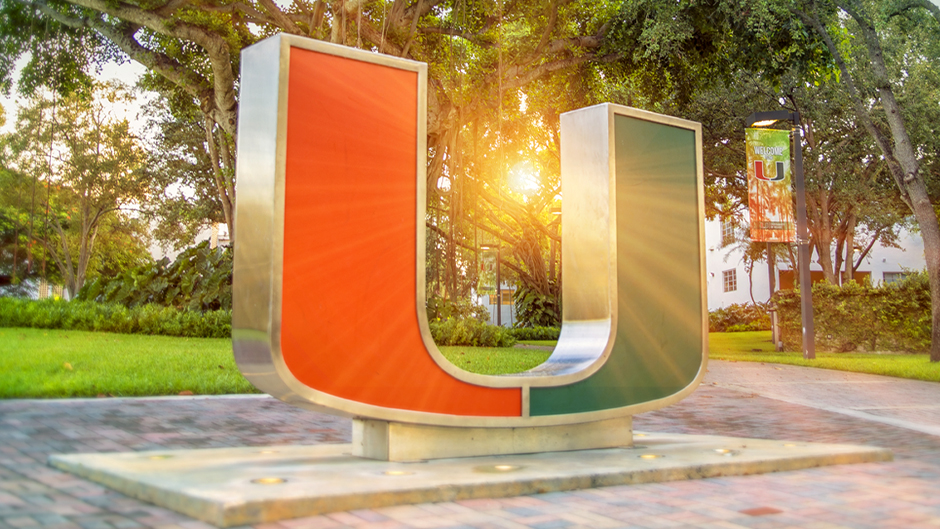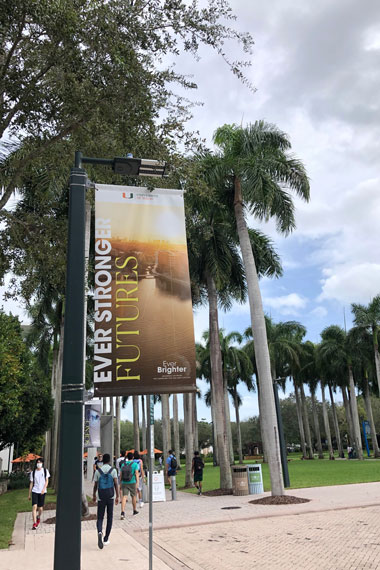Campaign illuminates the University’s ever brighter future
Maya Bell, 11-01-2021

With Homecoming on the horizon, the University of Miami is publicly launching its most ambitious fundraising campaign ever, a $2.5 billion initiative—the largest of any private institution in Florida—that is already accelerating the University’s drive to shape a brighter future for our students, our community, our health, and the health of our planet.
Since Ever Brighter: The University of Miami’s Campaign for Our Next Century quietly commenced with President Julio Frenk’s arrival six years ago, more than $1.6 billion has been raised through the generosity of more than 120,000 donors who have embraced the University’s commitment to provide modern housing and more scholarships to more diverse students; create a healthier, more sustainable future; recruit leading innovators; and reimagine learning in a world changing at lightspeed. The campaign will conclude in 2025 when the University celebrates is centennial.
The interim tally already exceeds the total raised during the University’s last fundraising initiative, Momentum2, and includes the largest gift in the University’s history—a grateful patient’s anonymous $126 million donation to Sylvester Comprehensive Cancer Center in honor of its director, Dr. Stephen Nimer. It also includes gifts at all levels—with the most common gift in the $100 range—from alumni, parents, students, and Hurricane fans everywhere.
“We are on our way to meeting our $2.5 billion goal, but Ever Brighter is not about a number,” said Frenk. “It is about enabling the University to be better, stronger, and bolder at doing what it has done since its founding in 1925: turn challenges into opportunities, lead in service to humanity, and be a force for good across our local and global communities. It is the embodiment of all that we have accomplished in science and discovery, in technology and the arts, in athletics and community engagement—and all that we can achieve in our next century.”
 Like the University’s first president, Bowman Foster Ashe, who opened the University’s doors amid the ruins of the 1926 hurricane that leveled the boomtown of Miami, Frenk steered the University through one of its most formidable challenges, the COVID-19 pandemic that shut down much of the world and exacerbated existing social injustices and health disparities.
Like the University’s first president, Bowman Foster Ashe, who opened the University’s doors amid the ruins of the 1926 hurricane that leveled the boomtown of Miami, Frenk steered the University through one of its most formidable challenges, the COVID-19 pandemic that shut down much of the world and exacerbated existing social injustices and health disparities.
But with Frenk’s steady hand and global public health expertise, and the resilience and resolve that has always characterized Miami Hurricanes, the University has emerged from the crisis with a growing endowment, a robust health system, its largest pool of applicants, and its strongest class of incoming students. The majority of these students will receive financial assistance, making their education at an institution dedicated to nurturing change agents like Shajena Erazo Cartagena possible.
A first-generation college student who attended the University on a scholarship and served as student trustee on the Board of Trustees, Erazo Cartagena was recently appointed assistant principal at one of Washington, D.C.’s toughest, inner-city schools—where nine years ago she founded a college readiness program for students who didn’t see higher education in their future. Every year since, she has made a contribution to her alma mater to support financial aid and the Division of Student Affairs.
“I want to return to the University what it gave me, which is an investment in the lives of young people, specifically young people who are furthest from opportunity, like I was,” said Erazo Cartagena, who graduated in 2009 and is now the mother of two. “This is why I work where I work.”
Now, with its centennial just four years away, the University is turning to another of its graduates and one of its greatest allies to turn up Ever Brighter’s volume—and energy. Lennar Corporation executive chairman Stuart A. Miller, the chair of the UHealth Board of Directors and former chair of the University’s Board of Trustees, is chairing the campaign, a role that continues his family’s long tradition of service and philanthropy established by his late parents.
The Leonard M. Miller School of Medicine, which was Florida’s first medical school and named in honor of the family’s patriarch, is the state’s top National Institutes of Health-funded institution. It also is the nation’s top producer of dual M.D./M.P.H. graduates who are committed to improving the health of all populations but especially the most vulnerable and underserved.
The school is also home to Sylvester Comprehensive Cancer Center, which under Nimer’s leadership has earned the distinction of being the only National Cancer Institute-designated cancer center in South Florida, and to Bascom Palmer Eye Institute, which for nearly two decades has been the nation’s No. 1 eye hospital and is on a quest to perform the first whole eye transplant.
“Our family is so proud to be part of the U. We have long believed that in order for Miami to be an ever greater city, it must be home to an ever greater University and an ever greater medical center,” said Miller. “Since its founding, the University of Miami has become an important driver for ever increasing student success, ever bolder breakthrough research and discovery, and ever impactful service to our community and beyond. One of my ultimate hopes for Ever Brighter is that others also will be inspired to get involved and lend their support, at all levels, to propel the University of Miami to ever greater heights.”
Those attending this week’s homecoming festivities can see the immense power of giving. Among the most visible sights is the spectacular Lakeside Village residential housing project, the first phase of a multiyear plan to modernize on-campus housing, which opened in August 2020.
Visitors will also see the impact beyond the fountain on Memorial Drive, where the Frost Institute for Chemistry and Molecular Science now stands. Slated to open next year, the institute is the first that Dr. Phillip and Patricia Frost envisioned with their landmark $100 million gift announced in January 2017 to establish a group of synergistic research centers that, patterned after the National Institutes of Health, will harness the interdisciplinary power of science, technology, engineering, and math (STEM) to catalyze the next discovery revolution. A second center, the Institute for Data Science and Computing (IDSC), positions the University at the center of the data revolution through research, education, ethics, and workforce training that touches every campus and every corner of the institution.
With a combined $12 million endowment from the John S. and James L. Knight Foundation and the Frosts, the University recently appointed Yelena Yesha to be the first of six new IDSC faculty members who will help expand the University’s expertise in artificial intelligence and machine learning. Renowned in the computing field for harnessing real-time data to solve complex problems in cybersecurity, remote sensing, health care, and e-commerce, Yesha is one of 100 newly endowed chairs expected to be created by the University by its centennial.
“One of the most important opportunities for the world right now is to harness the power of data science to understand complicated problems and find great solutions,” said Jeffrey L. Duerk, the University’s executive vice president for academic affairs and provost. “This accelerates our ability to do that. While the internet powered the last tech revolution, data science, machine learning, and artificial intelligence will drive the next one.”
Visitors also may notice the familiar names of Patti and Allan Herbert, alumni who established the Patti and Allan Herbert Wellness Center in 2008, on the University’s school of business. In 2019, it was named the University of Miami Patti and Allan Herbert Business School to honor the couple’s more than $100 million in lifetime of giving to the U.
Today, with a true interdisciplinary focus, the Miami Herbert Business School offers the first-of-its-kind STEM-certified Master of Science in Sustainable Business, in collaboration with the Rosenstiel School of Marine and Atmospheric Science, the School of Architecture, and College of Engineering.
For the Herberts, giving to the U was always an act of love, a concrete expression of their gratitude to their alma mater, where they earned their business degrees in the 1950s, made lifelong friends, gained leadership skills, forged their successful careers—and met each other.
Philanthropy from longtime fans also plays an integral role in supporting our student-athletes in achieving success both on the field and in the classroom. Our women’s athletics programs are reaching new heights as a result of philanthropic support and a $14 million commitment from the Soffer family—the largest donation to the Department of Athletics—made possible the state-of-the-art Carol Soffer Indoor Practice Facility.
But it’s not always enduring ties to the University that generate support. Often, it’s the University’s groundbreaking research that attracts supporters who are driven to make a difference. Lou and Chosun Mastriani have never visited the University. But, alarmed by the continuing climate-related threats to the world’s imperiled coral reefs, the avid snorkelers searched the internet for marine schools engaged in coral reef conservation and protections—and the Rosenstiel School’s efforts stood out.
The couple has since created the Lou and Chosun Mastriani Endowed Scholarship Fund to provide financial assistance to undergraduate students who are studying marine biology, ecology, and coral reefs. They’ve also included the scholarship in their estate giving plans. “You go underwater, and you forget about any cares you have,” said Lou Mastriani, an international trade lawyer in Washington, D.C. “But now we see the damage from coral bleaching and stony coral tissue loss disease in our backyard. So, we’re grateful the University is committed to protecting and restoring these vital ecosystems.”
Designed to amplify the University’s strengths in areas where it has long shined, the Ever Brighter campaign goals are focused on seven themes, offering opportunities for every interest. They include creating brighter outcomes for the health and wellness of people and our planet, fueling scientific breakthroughs and education innovations for a changing world, building a more vibrant culture, nurturing more champions and leaders, and providing brighter opportunities for all.
“We are grateful to the thousands of individuals who believe in the power of the U and have made Ever Brighter the most successful campaign in our history,” said Josh Friedman, senior vice president for Development and Alumni Relations. “Their generosity is advancing innovations, transforming the lives of students and patients, and elevating the health of our community. And the University of Miami has so much more to offer—to be at the forefront in addressing the challenges facing society and elevating humanity in all its forms. This is our time as Miami Hurricanes. Join us.”
For more information, visit the campaign’s website—Ever Brighter: The Campaign for Our Next Century.